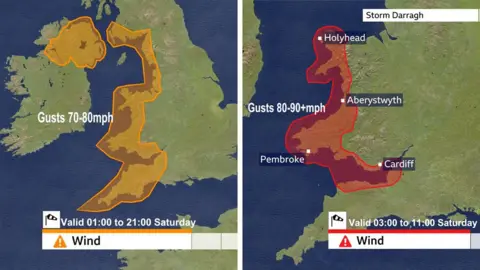Storm Darragh: Millions sent alert after rare red weather warning
Millions sent government alert as Storm Darragh approaches
Emergency government alert goes off during forecast

Around three million people in parts of Wales and south-west England have been sent an emergency alert from the government as Storm Darragh approaches the UK.
It is the largest use of the warning system yet and has been sent to the mobile phones of people in areas covered by the Met Office red weather warning for the storm.
The alert made a loud siren-like sound when it was delivered to devices, even if they were set on silent, and lasted for around 10 seconds.
The Met Office issued a rare red warning - the most serious type - earlier on Friday for wind. It is in place from 03:00 to 11:00 GMT on Saturday.
Storm Darragh forecast
The Met Office only issues red warnings when meteorologists believe that dangerous, potentially life-threatening weather is expected imminently.
Western and southern coastal regions of Wales, as well as the Bristol Channel including parts of Bristol and Cardiff are all covered by the warning.
The areas are forecast wind gusts of 90mph (144kmph) or more, the Met Office said.
The government alert was sent to every compatible mobile phone in impacted areas, containing information about the warning and guidance on how to stay safe into Saturday.
It said Storm Darragh was expected to cause "significant disruption", warning that strong winds can cause flying debris, falling trees and large waves, "all of which can present a danger to life".
"Stay indoors if you can," the alert said. "It is not safe to drive in these conditions."
The alert said the storm may cause power cuts and disruption to mobile phone coverage, and told people to "consider gathering torches, batteries, a mobile phone power pack and other essential items you already have at home".

Outside of test scenarios, the alert system has been used twice before, though both times on a smaller scale.
The last Met Office red warning was issued in January for winds in north-east Scotland.
Late on Friday evening, winds were beginning to pick up across Wales and south-west England, with the highest gusts reaching 74mph in north-west Wales.
Amber warnings covering Northern Ireland, Wales and the west coast of England are in place on Saturday morning, as well as less serious yellow warnings for large parts of the rest of the UK.
The winds are also expected to cause large waves, power cuts affecting mobile phone services, as well as damage to buildings and homes. Transport networks are also anticipated to be affected.
The Met Office said the strongest winds would subside by late Saturday morning, but that it would remain very windy until the evening, with amber warnings remaining in place until then.
Amber and yellow rain warnings, indicating a risk of flooding, is also in place in parts of the western UK.
In the north of Scotland, a yellow warning for snow is in place, with areas above 400m (1,300ft) getting up to 20cm (8in) of snow.
The Irish Meteorological Service has also issued a red warning for wind from 22:00 GMT on Friday across parts of counties Donegal, Leitrim and Sligo.
In Wales, all domestic football and rugby matches scheduled for Saturday have been cancelled, as has Cardiff City's Championship fixture against Watford which had been due to kick off at 15:00 GMT.
Other postponed Saturday football matches include Newport County v Carlisle United in League Two and Plymouth v Oxford United in the Championship.

Meanwhile, Welsh Rugby Union has postponed all community rugby fixtures.
As the weather worsened on Friday evening, shops and cafes in Welsh towns made the decision to close on Saturday the run-up to the festive period.
For many businesses, this could mean a significant loss of earnings on one of the busiest shopping days of the season.
Across the Bristol Channel in Somerset's Weston-super-Mare, another area covered by the red warning, businesses along the seafront have secured their outdoor furniture and plan to open later on Saturday morning.
In Weston-super-Mare, businesses are battening down for the storm
Across the UK, there have also been widespread cancellations of winter events and Christmas markets scheduled for the weekend.
In London, all of the Royal Parks will close on Saturday which includes the popular Winter Wonderland attraction in Hyde Park.
Belfast City Council said the city's Christmas market would close on Saturday due to the weather warnings, while the Enchanted Winter Garden events at Antrim Castle Gardens had been cancelled for Friday and Saturday.
Longleat Safari Park in Wiltshire said on its website it would not open on Saturday for safety reasons due to the weather.
Travel providers have warned of cancellations and disruption this weekend.
Cardiff Airport said its runway will be closed between 03:00 and 11:00 GMT on Saturday and advised those due to travel to contact their airline or tour operator.
Bristol Airport has also warned passengers that "disruption is expected" this weekend and they should check with their airline before travelling.
Train operators CrossCountry and Chiltern Railways told passengers to only travel if "absolutely necessary", while Great Western Railway advised customers due to travel this weekend to "change plans if possible".
South Western Railway said high wind speeds meant some services had been changed for Saturday, while London Northwestern Railway and West Midlands Railway said there may be disruption over the weekend.
Ferry crossings between Newcastle and Amsterdam have been cancelled until Sunday due to "adverse weather conditions", operator DFDS said.
Stena Line ferries said some services across the Irish Sea on Saturday would be cancelled, while the Scottish CalMac operator said some routes could face disruption at short notice.
Storm Darragh is the fourth named storm of the year, after Ashley, Bert and Conall.
Some parts of the UK are still recovering from Storm Bert, which caused extreme flooding and led to the deaths of five people in November.
Scientists say as the Earth's climate warms, extreme weather events will become more frequent. For every 1C rise in average temperature, the atmosphere can hold up to around 7% more moisture.
Globally, heavy rainfall events have become more frequent and intense over most land regions, according to the UN's climate body, which says the pattern will intensify with further warming.










































![3 Best Methods for iOS Pokemon GO Spoofing [No PC]](/_largethumb/uploads/news/115/11539/8/11539847-3-best-methods-for-ios-pokemon-go-spoofing-no-pc.jpg.webp)
![3 Best Methods for iOS Pokemon GO Spoofing [No PC]](/_newsthumb/uploads/news/115/11539/8/11539847-3-best-methods-for-ios-pokemon-go-spoofing-no-pc.jpg.webp)





